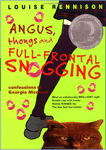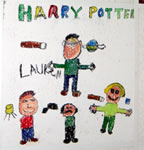The library media specialist must be an advocate for intellectual freedom.
 I don't think we should have books containing "bad words" in our library.
I don't think we should have books containing "bad words" in our library.
Google, Yahoo, and all those other search engines just bring porn into the school. We should filter everything on the Internet.
I don't think children should be allowed to read about witches, wizards, or magic. It's against our religion.
These could be comments made at school board meetings, in parent organizations, or even in your library. As a teacher librarian, keep in mind that one of the cornerstones of democracy is the right to free expression.
 Intellectual freedom is the right of any person to hold any belief on any subject and to express such beliefs or ideas in the way he or she believes appropriate. The question of intellectual freedom is at the core of the library philosophy. The question of intellectual freedom related to the right of unrestricted access to all information and ideas regardless of the medium of communication.
Intellectual freedom is the right of any person to hold any belief on any subject and to express such beliefs or ideas in the way he or she believes appropriate. The question of intellectual freedom is at the core of the library philosophy. The question of intellectual freedom related to the right of unrestricted access to all information and ideas regardless of the medium of communication.
Parents can protest, but they are not free to interfere with the right of other people's children to read what they wish. The role of the teacher librarian is to mediate and guard the rights of both parents and children.
The value you place on intellectual freedom will influence the materials your make available to your students.
![]() Skim the Intellectual Freedom materials at the American Library Association website.
Skim the Intellectual Freedom materials at the American Library Association website.
Explore a wide range of issues at the American Library Association's Intellectual Freedom Issues page.
![]() Read Appendix
IV by B.J. Morris in Administering the
School Library Media Center.
Read Appendix
IV by B.J. Morris in Administering the
School Library Media Center.
What is censorship?
Rejection of an informational material by a library authority which the librarian, the school board, or some person bringing pressure on them holds to be objectionable is called censorship. People may complain that the item is obscene, dangerously radical, subversive, or too critical of existing mores. Complaints are often in the categories of sex, race, religion, values, alternative lifestyles, profanity, drugs, sex-role stereotypes, defaming of "heroes", works by "questionable writers", violence, and satantic/demonic activities.
Sometimes people feel personally threatened by materials. For example, the Lorax was thought to be a threat to the economy. Some parents fear for their children. Others fear for society. For example, people have said that Charlotte's Web and Animal Farm represent satanic practices because the animals talk. In Little Red Riding Hood, the girl is carrying wine and some say this promotes alcoholism.
Always keep in mind that selection is liberty of thought. Censorship is control of thought.
A number of United States Supreme Court rulings have spoken to the issue of censorship. The best known was a 1982 ruling called Board of Education, Island Trees School District v. Pico. The decision found that local school boards may not remove books from school libraries simply because they dislike the contents of the materials.
![]() Read Banned Books by Claire Mullally at First Amendment Center.
Read Banned Books by Claire Mullally at First Amendment Center.
How can censorship problems be resolved without a legal battle?
There are many things you can do to avoid heated conflicts related to censorship. These include:
- good interpersonal relations
- reduce the strong feelings of the complainer
- reduce pressure from special interest groups
- get backing from a library organization such as ILF, AIME, and AASL
- form an intellectual freedom committee
- have a policy and strict procedures in place
- follow a good selection policy and you'll be fine
What guidelines can be used?
You don't need to start from scratch the American Library Association and others provide excellent guidance and materials.
Explore Challenged and Banned Books from ALA
What types of complaints are likely?
There are generally three types of complaints: in-house, parents, and public.
In-house. These complaints come from teachers who have used particular materials. In most cases, their concerns relate to inaccurate information or materials inappropriate for the developmental level of their children. For example, a teacher might find an old videotape that was produced before new methods were developed for dealing with blood pathegons. Or, a website on a library site pathfinder was at a reading level way too high for the class.
A fter examining the item and reviewing the selection policy, it's likely that the materials would be weeded anyway so no additional action is needed.
fter examining the item and reviewing the selection policy, it's likely that the materials would be weeded anyway so no additional action is needed.
However, this is not always the case. Recently a book was challenged by a teacher in Montana and the school board ruled in favor of the reconsideration committee to keep the book.
Parents. The concerns of parents often focus on a particular item. For example, a parent may not like a particular book or series such as the Harry Potter books. Judy Blume's books have always been a favorite target because of situations and language. Some parents are concerns about the "family values" that are represented or the lack of respect of elders. Almost any popular intermediate or young adult realistic fiction books could become a target.
![]() Read Judy Blume Talks about Censorship.
Read Judy Blume Talks about Censorship.
Read (excerpt from) Places I Never Meant to Be by Judy Blume
Read Is Harry Potter Evil? by Judy Blume
Public. Sometimes a group of people get together to challenge an item. Sometimes fundamentalist groups target particular schools. They may seek widespread change and request many withdrawls.
Teacher and parent complaints are generally easy to handle. It's the public complaints that cause problems. A good reconsideration policy can really help.
Increasingly, government agencies are getting involves with conducting "reviews". Read the article below regarding South Dakota's Governor's web review process.
How common are challenges?
According to the American Library Association, there were 6364 challenges reported to the Office for Intellectual Freedom during the 1990s. Three quarters of the challenges were made to schools or school libraries. Sixty percent were from parents. The top three concerns were sexually explicit materials, offensive language, and non-age appropriateness.
![]() Read Violence in the Media: A Joint Statement from the American Library Association. Do you agree with their principles? Why or why not?
Read Violence in the Media: A Joint Statement from the American Library Association. Do you agree with their principles? Why or why not?
Where do you draw the line?
Censorship involves control. It's the idea that one person is making the decision for others about what should or should not be available. The position of librarian is very powerful. Every time you choose not make a purchase, you are restricting access to that item. Of course it's not possible to buy everything. However all decisions must be made on the basis of a selection policy, not your personal preferences.
The school librarian has a unique set of responsibilities related to intellectual freedom. We must balance the needs of the curriculum and mission of the school with the importance of intellectual freedom. Language such as developmental level and age appropriateness are found in selection policies for school libraries. These issues words lend themselves to different interpretations, but should not be used as an excuse for censorship.
Only by being aware of your own bias can you be an advocate for intellectual freedom.
What is reconsideration?
If a person wishes to formally challenge materials used in a school district, a reconsideration process is followed. Normally, a standard form is completed by the person making the complaint. The reconsideration process involves re-examining the materials to determine whether the selection policies and procedures were properly followed. A reconsideration committee will determine whether the material is appropriate for its designated audience. This committee has the following options:
- take no removal action
- remove all or part of the challenged material
- allow alternative materials
- limit use of materials
In some cases, the recommendation of the committee is final. In other cases, the committee's findings can be appealed to the school board.
Read Dealing with Challenges to Books and Other Library Materials from the American Library Association.
Organizations
American Library Association Office for Intellectual Freedom
http://www.ala.org/Template.cfm?Section=oif
Use their Intellectual Freedom Toolkits for development your own materials.
National Coalition Against Censorship (NCAC)
http://www.ncac.org/
People for the American Way
http://www.pfaw.org/
Check Your Understanding
![]() Information
Power: Information Access and Delivery - Principle 6.
Information
Power: Information Access and Delivery - Principle 6.
The library media
program is founded on a commitment to the right of intellectual freedom.
(p. 83, 91)
Make It Real
 Taking a stand on an issue of intellectual freedom takes courage.
Taking a stand on an issue of intellectual freedom takes courage.
Will you be ready to face this challenge?
Are you prepared?
Create a list of resources that will help you be ready for a challenge.
Read More About It
Bernstein, Sandra (1996). When the Censor Comes. Book and Periodical Council (Canada)
http://www.efc.ca/pages/chronicle/whattodo.html
Guide for librarians, teachers, booksellers and others who face righteous-minded censors, usually without warning or time to prepare.
Cromwell, Sharon (Oct. 1997). Banning Books from the Classroom: How to Handle Cries for Censorship. Education World.
http://www.education-world.com/a_curr/curr031.shtml
Discusses how to handle challenges and how they can be avoided in the first place.
Coping with Challenges from American Library Association
http://www.ala.org/...
Addressing these challenges requires a balance of carefully crafted library policy, knowledge and understanding of intellectual freedom principles, and sensitivity to community needs and concerns. It also requires effective communication.
Intellectual Freedom Manual for Kansas (1999). Kansas Association of School Librarians.
http://skyways.lib.ks.us/kasl/ifmanual.htm
Designed to help librarians deal with a variety of intellectual freedom issues.
Intellectual Freedom from Massachusetts School Library Media Association
http://www.mslma.org/whoweare/intellfreedom.html
Intellectual Freedom Handbook from Maine Association of School Libraries
http://www.maslibraries.org/about/intelfred/intelfred.html
PABBIS (Parents Against Bad Books in Schools), Virginia
http://pabbis.com/
Sections:
List of Lists of Books that have been Challenged
http://www.pabbis.com/listoflistsbyauthorrev1.htm
PABBIS News http://www.pabbis.com/news.htm
This is a group that has been challenging many school library books. Be on the look out for this group in your area.
Quick and Easy Guide to the Office for Intellectual Freedom's Pages from American Library Association
http://www.ala.org/ala/oif/quickeasyguide.htm